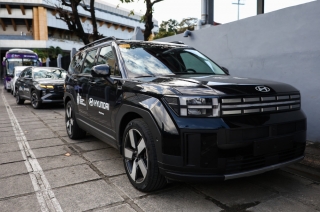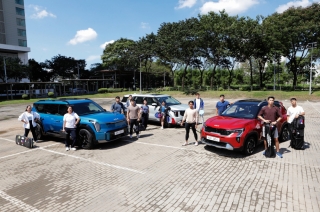
While Metro Manila is under the enhanced community quarantine (ECQ) from today until August 20, updated guidelines regarding the passenger capacity of public utility vehicles (PUVs) were released by the Land Transportation Franchising and Regulatory Board (LTFRB). This is to be implemented in order to limit the spread of the COVID-19 Delta variant among commuters.
Below are the passenger capacity guidelines of PUVs outlined by the LTFRB together with the Department of Transportation (DOTr). The following rules shall be effective throughout the entire ECQ period.
Public Utility Bus (PUBs)
- 50 percent of the vehicle’s capacity
- One seat apart
- No standing
Public Utility Jeepney (PUJs)
- 50%of vehicle’s capacity
- One seat apart
- No standing
UV Express
- Maximum of two passengers per row (not exceeding 50% of vehicle’s capacity)
- One passenger on driver’s row
Taxis and TNVS
- Maximum of two passengers per row
- One passenger on driver’s row
Motorcycle Taxis
- Limited to a pilot study
- Subject to National Task Force (NTF) against COVID-19 guidelines
Provincial Buses
- 50 percent of the vehicle’s capacity
- One seat apart
- No standing
- Subject to LGU restrictions
Shuttle Service
- One-seat apart and other guidelines in accordance with DTI-DOLE JMC No. 2020-04-A
During the strict quarantine period, only authorized persons outside of residence (APOR) will be allowed to ride PUVs, including government employees, emergency respondents, healthcare workers, and many more. That said, commuters must be able to prove that they are an APOR by presenting a valid ID and other important documents. Furthermore, the DOTr ensures that public railway systems such as the Philippine National Railways (PNR), Light Rail Transit 1, (LRT-1), Light Rail Transit 2 (LRT-2), and Metro Rail Transit (MRT-3) will continue their operation during the ECQ period.
The following guidelines will be strictly implemented in order to assure the health and safety of the public. The LTFRB, Philippine National Police (PNP), Armed Forces of the Philippines (AFP), Inter-Agency Council for Traffic (I-ACT), and IATF authorized personnel will conduct random daily inspections on PUV terminals.
Latest News
-
Geely’s EX2 EV headed to Australia — is a Philippine launch possible? / News
The Geely EX2 is confirmed to go on sale in Australia in 2026. Could a launch in the Philippines also be on the cards?
-
Hyundai Motor Philippines is the FIFA Futsal Women's Teams' official mobility partner / News
Hyundai Motor Philippines strengthened its partnership with FIFA through its support of the FIFA Futsal Women's Teams.
-
Kia Philippines backs EJ Obiena as Atletang Ayala continues championing Filipino athletes / News
Kia Philippines strengthens its support for EJ Obiena, backing the Olympian with dedicated mobility at home and abroad.
Popular Articles
-
Electric Vehicles in the Philippines for under P1 million
Jerome Tresvalles · Aug 19, 2025
-
Top 3 Cars For Every Lifestyle—What Cars Are Right For You? | Behind a Desk
Caco Tirona · Apr 24, 2024
-
5 Tips to Maximize Fuel Efficiency
Jerome Tresvalles · Sep 09, 2024
-
Five driving habits that are draining your fuel tank
Jerome Tresvalles · Jun 24, 2025
-
Can engine braking harm your engine?
Jerome Tresvalles · Sep 11, 2025
-
Do electric cars even need maintenance?
Jerome Tresvalles · Oct 23, 2024
-
Best vehicles for an active outdoor lifestyle
Shaynah Miranda · Jul 25, 2024
-
How to drive different types of vehicle transmissions
May 23, 2024
-
5 easy ways to keep your car interior clean
Allysa Mae Zulueta · Nov 15, 2021
-
How to survive Metro Manila traffic
Earl Lee · Aug 16, 2022



